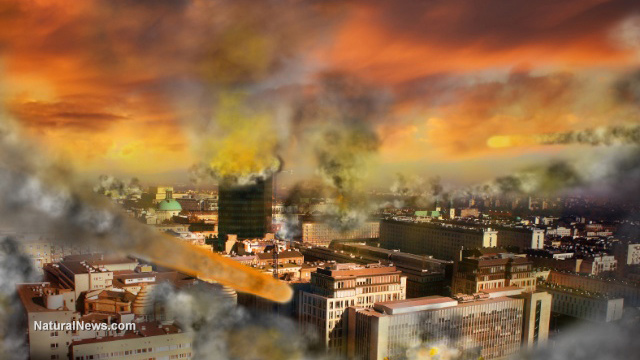World War E: Are you prepared for the end of civilization?
Sunday, September 28, 2014 by: Daisy Luther
Tags: World War E, prepping, societal collapse

- Newly released JFK files reveal Pentagon's role in creating Lyme disease and covid in the same lab
- Trump's greatest betrayal so far: Accelerating Middle East wars, silencing dissent, and serving Zionist masters
- The hidden dangers in your kitchen: How cooking methods impact diabetes, cancer and aging
- STARDUST, a secretive Israeli-US startup, plans risky solar geoengineering experiment to BLOCK OUT THE SUN
- DEADLY DECEPTION: How COVID vaccines increased mortality rates and why authorities hid the truth
- Arkansas embraces medical freedom with landmark ivermectin law
- CDC finally halts $11 billion COVID funding scam as health officials admit the ‘pandemic’ was a fraud
- Lab leak confirmed? Boris Johnson's stunning reversal on COVID origins sparks global debate
- Home gardening for preppers: A beginner's guide to growing your own food
- Unraveling the paradox: Why intelligent individuals fall prey to everyday blunders
- YouTube’s double standard: CEO defends censorship while claiming free speech champion status
- GAIN-OF-FUNCTION CAT-BIRD-FLU now on the rise as nearly a dozen cats in Colorado "test positive" for Bird Flu due to contaminated cat food
- “Feel G.O.O.D. Gut Health Program” on BrightU: Why elimination diet is good for you
- Cartels shift tactics: Kidnappings and organ trafficking surge as border crossings plummet under Trump policies
- Why you should think twice before buying mainstream toothpaste formulas
- “Rent-a-womb” scandal: How China is exploiting U.S. birthright citizenship for long-term espionage
- Was JFK's assassination orchestrated by a CIA double agent? New evidence points to James Angleton as the “architect”
- Record honeybee deaths devastate U.S. agriculture, pesticides under scrutiny
- Newly released JFK files reveal Pentagon's role in creating Lyme disease and covid in the same lab
- Elon Musk: Aliens could be here on Earth RIGHT NOW
- Reclaim your health: How midlife exercise reverses years of inactivity
- Trump reverses course on Gaza plan, says “nobody is expelling Palestinians”
- EPA advisor admits the agency is funneling billions to climate groups ahead of Trump’s return to White House
- Big Pharma's $8 Billion bribery scheme exposed: how doctors are pushed to prescribe junk science, not heal
- Space war brewing? Russia threatens to destroy Starlink satellites
- A lack of integrity in Academia: Harvard professor found GUILTY of fraudulent research to promote CRT theory
- Survival 101: Effective EMF blocking techniques
- Rep. Nancy Mace introduces bill to ban biological males from female facilities on federal property
- Mike Adams Sermon 66: God will DESTROY ISRAEL for its wickedness
- Pilots report mysterious lights 'moving at extreme speeds' across Oregon skies
- 5 Simple steps to boost your brainpower: How to strengthen executive function in a distracted world
- Historian warns Israel may be entering an “IRREMEDIABLE DECLINE”
- Florida takes a stand: DeSantis proposes permanent ban on mRNA vaccine mandates
- RFK Jr.'s SSRI antidepressant investigation sparks liberal meltdown, exposes Big Pharma's dangerous game
- OpenAI whistleblower who dissented against how the company trained ChatGPT found dead
- Sugarcane extract superior to cholesterol-lowering drugs?
- EPA advisor admits the agency is funneling billions to climate groups ahead of Trump’s return to White House
- The Health Ranger releases “Vaccine Zombie” song and music video, using AI-animated zombies for the music video
- California's social media censorship law struck down: A victory for free speech or a threat to online safety?
- Dr. Mike Yeadon releases 15-minute testimony - WATCH - about genocidal intent of COVID “vaccines”
- The pandemic as a tool for INDOCTRINATION: Understanding “The Indoctrinated Brain” by Dr. Michael Nehls
- Mike Adams releases country western hit single: Goin’ Back in Time is Comin’ Home
- Mike Adams releases music poetry sensation: A Child of God
- RFK Jr. clears key hurdle: Sen. Susan Collins backs controversial HHS nominee, signaling a new era for health policy
- Florida takes a stand: DeSantis proposes permanent ban on mRNA vaccine mandates
- Unpacking the Lies That We’ve Been Fed – new song and music video released by Mike Adams, the Health Ranger
- Mike Adams releases new song and music video: Nothing More Disgusting Than a Globalist
- Congratulations to the FULLY UNVACCINATED as you resisted the COVID-19 PROPAGANDA MACHINE fueled by over $100 BILLION
- “Why we influenced the 2020 elections”: Facebook files reveal the coordinated effort to bury the Hunter Biden laptop story
- Michigan sheriff announces criminal investigation into 2020 election crimes, Dominion Voting Systems
- Israeli soldiers accused of even more torture and abuse in the West Bank
- Migrants are taking advantage of recent hurricanes to scam residents and loot their homes
- House Intelligence Committee calls for the ARREST and PROSECUTION of Dr. Anthony Fauci
- Peter Rost exposes Big Pharma corruption in his book “The Whistleblower: Confessions of a Healthcare Hitman”
- Red Cross issues warning to stop blood plasma donations from vaccinated people
- Scientists confirm: GENIUS brain function can be spontaneously unleashed in humans without any apparent cause
- EPA advisor admits the agency is funneling billions to climate groups ahead of Trump’s return to White House
- HYSSOP: What research reveals about the health benefits of this ancient holy herb
- Two containers with completed ballots fall out of truck in Florida
- Fully vaccinated about to see “tsunami” of illness and death, warns virologist
- Global leaders unite to clamp down on “misinformation” with UN-backed Cascais Declaration
- BREAKING: 2025 NDAA authorizes mandatory military draft of WOMEN across America… as Pentagon pursues global NUCLEAR war with both Russia and China at the same time
- Michael Yon warns of a ZIONIST TAKEOVER in Trump’s second administration
- BOMBSHELL: DNA testing kits are a SCAM to develop ethnic-specific bioweapons
- Ozempic and Wegovy weight loss drugs are injectable LIZARD VENOM PEPTIDES that may unleash a devastating wave of organ failure… side effects align with symptoms of SNAKE BITES
- Israeli soldiers accused of even more torture and abuse in the West Bank
- These 13 countries just signed an agreement to engineer a global FAMINE by destroying food supply
- NASA admits that climate change occurs because of changes in Earth’s solar orbit, and NOT because of SUVs and fossil fuels
- RFK Jr. clears key hurdle: Sen. Susan Collins backs controversial HHS nominee, signaling a new era for health policy
- Sermon 30: How Jesus reveals Caesar’s FAKE CURRENCY and FALSE AUTHORITY
- Coriander seeds: Ancient medicine backed by modern science
- Arizona officials claim Maricopa County needs 10-13 days to tabulate results of the election
Since social distancing is the most effective way to protect yourself and your family from exposure, now is the time to prepare for the possibility that you might need to stay in your home for an undefined amount of time. Despite the claims of Big Pharma, which is feverishly concocting vaccines that will be promoted -- perhaps forcibly -- to one and all, the best way to avoid contracting the virus is to not be exposed to it.
However, there's another reason why you might need to go into a voluntary family quarantine, and no one is talking about it.
That reason is widespread civil unrest the likes of which we've never seen in this country before.
What does the breakdown of civilization really look like?
We've all read about the looting and chaos that erupts in the wake of a natural disaster. Just a short-term disruption in public utilities, the just-in-time food delivery system and government aid can result in pandemonium. Throw in a bunch of people dying a gory death, and we'll see exactly how thin our veneer of civilization really is. We recently saw a glimpse of what could be coming our way during the riots in Ferguson, Missouri, but that was mild compared to the potential scene in the event of a pandemic.In her article, "Anatomy of a Breakdown," Tess Pennington, a preparedness expert who formally trained with the Red Cross in emergency and disaster response, writes of the four phases of any breakdown of society. Initially, there is the warning phase, during which people are told by the government that an event is pending; this is the point during which you see the run on supplies at the stores as folks rush in to buy water and non-perishable food.
Next, Pennington writes, is the "shock and awe" phase. During this immediate aftermath of the event, many people will be somewhat paralyzed and unable to function. Some will be awaiting rescue by government agencies, while others will simply be looking for direction. This is a phase of cognitive dissonance, as their mind struggles to cope with their new reality.
The real danger comes during the third phase: the Breakdown. Pennington says that this phase generally occurs 3-5 days after a disaster. She writes:
Have you ever heard the saying, "We're three days away from anarchy?" In the wake of a disaster, that's all you have is three days to turn the crazy train around before crime, looting and chaos ensue. In reports during the aftermath of hurricane Sandy, residents from Staten Island were pleading for help from elected officials, begging for gasoline, food and clothing.
"We're going to die! We're going to freeze! We got 90-year-old people!" Donna Solli told visiting officials. "You don't understand. You gotta get your trucks down here on the corner now. It's been three days!"
Similar stories of looting occurred during the tornado in Joplin, MO, of 2011. This time, the looting occurred from National Guard soldiers patrolling the area.
"The night of the tornado, as emergency responders rushed from one shattered home to the next, Steve Dixon sat outside his father's destroyed house with a baseball bat. They wouldn't see me sitting here in my chair, I was in the dark," he told NPR. "I'd turn my bright spotlight on them and tell them they needed to move on. Then when the police came by, I'd tell them which way they went."
Multiple factors contribute to societal breakdowns including failure of adequate government response, population density, citizens taking advantage of the grid being down and overwhelmed emergency response teams.
For whatever reason, 3-5 days following a disaster is the bewitching hour. During this short amount of time, the population slowly becomes a powder keg full of angry, desperate citizens.A good example is the chaos that ensued in New Orleans following the absence of action from the local government or a timely effective federal response in the aftermath of Hurricane Katrina. In such troubled times, people were forced to fend for themselves and their families, by any means necessary. This timeline of Hurricane Katrina effectively illustrates "the breakdown," and within three days, the citizens of New Orleans descended into anarchy, looting and murder (Source).
If this scenario isn't bad enough, at the end of this time frame, there will be an increase in illnesses due to cramped living quarters from emergency shelters,sanitation-related illness, compromised water sources and exposure to natural elements. In the aftermath of the Haitian earthquake, sanitation- related [sic] epidemics became a large concern for the disaster victims. In fact, the outbreak erupted into the world's largest cholera epidemic despite a huge international mobilization still dealing with the effects of the Jan. 12, 2010, earthquake (Source).
Now, the above scenario relates to an isolated local disaster, like a terrible storm or earthquake. Multiply this by a widespread, perhaps even global, event. In such an event, the following things are likely to occur:
Transportation of goods will grind to a halt. In a 2012 industry report, the American Trucking Association pointed out exactly how dependent our country is on timely deliveries of goods like food and medicine. Mac Slavo of SHTFplan wrote of the report, "A shut down of truck operations as a result of elevated threat levels, terrorist attacks, or pandemics would, according to the report, have 'a swift and devastating impact on the food, healthcare, transportation,waste removal, retail, manufacturing, and financial sectors.'" In the event that the transportation of goods halted, once the store shelves are bare, supplies won't be coming to replenish them anytime soon. Your supplies will consist only of what you already have, so be sure to have food, water and medical supplies. (You can find a checklist HERE.)
First responders like police officers, firemen and paramedics will be taking care of their own families. In the event of a true breakdown, you won't be able to rely on 911, whether someone is breaking into your house, a structure is on fire or a family member has suffered a medical emergency. You need to be prepared to deal with these things on your own. Consider stocking home fire extinguishers, weapons and ammo, and a first aid kit with trauma supplies.
Communications systems may fail. Not only are communications important for staying in touch with loved ones, but reliable news and information can be vital to keeping your family safe. If the power goes out, the television and radio stations will only have a limited amount of fuel. This means that, once they run out, sources of information will be extremely limited. By adding secondary communications devices to your preparations, you have a far better chance of receiving information and being able to contact family members. One of the most highly recommended communication methods during a disaster is a HAM radio.
Utilities like water and electrical power may be interrupted. If there is no staff to maintain utilities, chances are good that they won't be reliable. If public utilities are inoperable, the following risks increase: people will succumb to extremes in climate; food will spoil; sanitation will become an issue; and desperate people will drink bad water, setting off a secondary pandemic of waterborne illnesses. When preparing for utility outages, consider the following priorities: heat, cooking, light, water, sanitation and waste disposal. You can learn more HERE.
Government response agencies like FEMA will be too overwhelmed to meet the needs of all affected. There are two major issues with relying on a government entity to save you. First of all, the larger the affected population is, the thinner the finite supplies must be rationed. It is most likely that the supplies will be doled out in large metropolitan areas, leaving outlying vicinities to cope without assistance. Secondly, whoever owns the sustenance is totally in control. Parents will do pretty much anything to feed their hungry children, and that includes toeing the line under martial law and giving up freedom in exchange for food. Having your own supplies buys you a kind of independence that those looking for a government handout will never have. (Learn more about how food has been used to control the populace throughout history.)
Voluntary acquiescence will dissolve as people become increasingly hungry, frightened and desperate. By voluntary acquiescence, I mean that, in normally functioning society, the laws are not enforced every minute of every day. There aren't guards protecting your home at all times. Your home is not broken into because people voluntarily follow the law for a variety of reasons. You can walk down the street without overwhelming fear of rape, robbery or violence, because people voluntarily conduct themselves in a non-violent fashion. Obviously, there are exceptions when people do opt to commit crimes, but the majority of the time, most people choose not to perpetrate these types of offensives. In the midst of a civil breakdown, however, this norm would shift dramatically the other way, in that you may be more likely to be the victim of a crime than not. People who are starving, afraid or hysterical will be less likely to behave in a lawful fashion. Since 911 is unlikely to respond in this type of scenario, you can only depend upon yourself. During the recent unrest in Ferguson, Missouri, the only businesses left unscathed by rioters were the ones in which the owners stood armed and ready to deter the criminals. If you aren't proficient with weapons, it's of vital importance that you get some instruction and prepare to defend yourself. Furthermore, you have to prep for this devolution of ethical behavior by creating a defense plan specific to your home and property. Graywolf, a military veteran and the author of Graywolf Survival, wrote, "If you're trying to defend a homestead or bug out location with a small group, you need to improve your odds by what are called force multipliers. One of the best ways to fight like a larger group is to prepare your battlespace." You need to be ready to defend your home, property, and family with lethal force should it become necessary. (You can learn more about how to apply these military force multiplier strategies to your own property HERE.)
You can only rely on yourself
The bottom line is this:In a widespread pandemic, you will have no one to rely on but yourself. The services, availability of supplies and public utilities that we have come to depend on may not be there, so you need to have alternatives in place. You don't want to be out there in the midst of a pandemic, battling it out for limited resources.
Here's a list of basic supplies to have on hand:
- Drinking water (1 gallon per person per day).
- Food (including items that don't require fuel for preparation). If you're on a tight budget, you can also check out The Pantry Primer for information on building a food supply quickly.
- Heavy duty garbage bags.
- Sanitation supplies such as toilet paper, paper towels, baby wipes and feminine hygiene supplies.
- Entertainment -- you'll want to be able to keep children and restless family members busy, so get craft supplies, books, games and puzzles.
- Basic medical supplies (here's a list).
- Pandemic kits that contain protective clothing (we have a QuakeKare Deluxe Pandemic Flu Kit for each family member).
- Extra N95 masks.
- Nitrile gloves.
- Safety goggles with an elastic band to ensure a snug fit.
- Antibacterial cleaners such as disposable wipes, bleach and spray cleaners.
- Antibacterial hand sanitizer.
Taking steps to prepare now can mean the difference between waiting it out, secure at home with your family, and risking exposure to a deadly virus and civil unrest for a meager bottle of water and an MRE.
Sources:
http://www.biodefense.com
http://readynutrition.com
http://www.shtfplan.com
http://undergroundmedic.com
http://graywolfsurvival.com
http://www.theorganicprepper.ca
http://www.amazon.com
About the author:
Daisy Luther is a freelance writer and editor who lives on a small organic farm in the Pacific Northwestern area of the United States. On her website, The Organic Prepper, Daisy writes about healthy prepping, homesteading adventures, and the pursuit of liberty and food freedom.
World War E at FETCH.news
Get independent news alerts on natural cures, food lab tests, cannabis medicine, science, robotics, drones, privacy and more.
Take Action: Support Natural News by linking to this article from your website
Permalink to this article:
Embed article link: (copy HTML code below):
Reprinting this article:
Non-commercial use OK, cite NaturalNews.com with clickable link.
Follow Natural News on Facebook, Twitter, Google Plus, and Pinterest
Science News & Studies
Medicine News and Information
Food News & Studies
Health News & Studies
Herbs News & Information
Pollution News & Studies
Cancer News & Studies
Climate News & Studies
Survival News & Information
Gear News & Information
News covering technology, stocks, hackers, and more



"Big Tech and mainstream media are constantly trying to silence the independent voices that dare to bring you the truth about toxic food ingredients, dangerous medications and the failed, fraudulent science of the profit-driven medical establishment.
Email is one of the best ways to make sure you stay informed, without the censorship of the tech giants (Google, Apple, Facebook, Twitter, YouTube, etc.). Stay informed and you'll even likely learn information that may help save your own life."
–The Health Ranger, Mike Adams













































